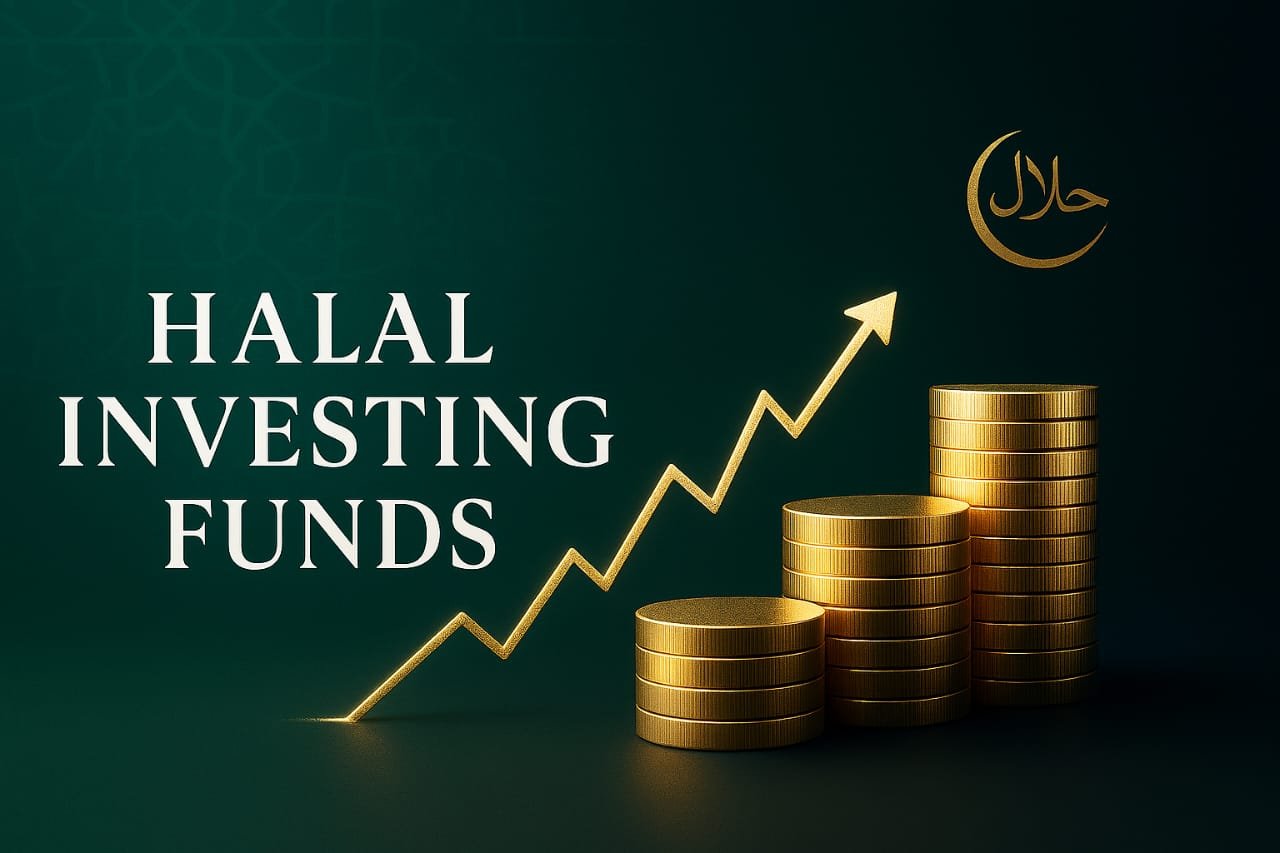Table of Contents
ToggleWhat are Halal Investing Funds?
We all have the desire to achieve financial freedom, but for a Muslim investor, the path is often filled with doubt and hesitation. It is not just about making money; it is about ensuring that every dollar or euro you earn is pure and free from Riba. As we navigate the complex markets of 2026, the challenge isn’t just finding profitable assets—it is finding peace of mind. This is where halal investing funds bridge the gap between faith and fortune.
Whether you are an expat working in Europe or a citizen in the US, choosing the right Sharia-compliant fund allows you to protect your wealth from inflation without compromising your religious values. In this guide, we will explore the best options available to you this year.”
When is a fund 'Halal?
A rigorous screening or verification process is followed before an investment is declared ‘halal’ or Shariah-compliant. This verification is usually conducted by an independent ‘Shariah Board’. Two main criteria are used:
Nature of Business
- Alcohol & Tobacco ✕
- Gambling / Casinos ✕
- Conventional Banking (Interest) ✕
- Pork Products ✕
- Debt Ratio < 33% ✔
- Cash/Interest Ratio < 33% ✔
- Impure Income < 5% (Must Purify) ✔
- Shariah Board Certified ✔
First, the underlying nature of the businesses included in halal investing funds is strictly examined to ensure Sharia compliance. These funds do not invest in the following areas as they are wholly or partially prohibited:
- Interest-based financial services (banks, insurance companies)
- Gambling
- Manufacture or sale of alcohol, tobacco, and narcotics
- Pork-related products
- Weapons or defense equipment (if morally sensitive)
- Pornography or adult entertainment
Financial Ratios Screening
Secondly, the financial structure of any company selected for halal investing funds must be analyzed against specific debt ratios. If a company relies on excessive interest or debt despite its business activities being halal, it may be excluded. Three main financial ratios are examined:
- Debt Ratio: The amount of interest-bearing debt compared to the company’s total assets should generally be less than 33%.
- Liquidity Ratio: The amount of cash or interest-bearing investments compared to the company’s total assets should generally be less than 33%.
- Interest Income Ratio: The amount of income from haram sources (such as interest) compared to the company’s total income should generally be less than 5%.
Main types of halal investing funds
When you want to invest in Halal Investing Funds, you will see three main options in the market:
Halal Mutual Funds
Among the various halal investing funds, these function like traditional mutual funds where a manager pools your money and that of other investors and invests it in Sharia-compliant stocks, bonds (sukuk), or real estate. These funds are actively managed.
Top Picks for 2026:
Amana Growth Fund (AMAGX): A consistent performer in the US market, focusing on large-cap growth stocks. Ideal for long-term investors seeking stability.
Amana Income Fund (AMANX): Focuses on dividend-paying companies, perfect for those looking for regular passive income.
Halal ETFs
ETF stands for Exchange Traded Fund. It is a pool of different stocks like a mutual fund, but it can be bought and sold directly on the stock market. Best Halal ETFs usually track an Islamic index (such as the S&P 500 Shariah Index). Because of low fees, ETFs are considered one of the most affordable halal investing funds for passive investors.
Top Halal ETFs to Watch in 2026:
If you are investing from North America (USA/Canada):
SPUS (SP Funds S&P 500 Sharia Industry Exclusions ETF): This ETF tracks the S&P 500 but filters out non-compliant companies. It is heavily weighted in tech giants like Apple and Microsoft, making it a high-growth option for 2026.
HLAL (Wahed FTSE USA Sharia ETF): Offers broader exposure to the US market, including healthcare and energy sectors.
If you are investing from Europe (UK, Ireland, Germany):
ISDW (iShares MSCI World Islamic UCITS ETF): This is the gold standard for European investors. It gives you exposure to global markets while being tax-efficient (UCITS compliant).
ISDU (iShares MSCI USA Islamic UCITS ETF): Allows you to invest specifically in the US economy while adhering to European regulations.
Islamic Indexes
These are not funds, but rather a list of a set of Sharia-compliant stocks that serve as a benchmark. Most top-rated halal investing funds track these indexes to strictly select their investments.
8 tips for choosing the best halal funds in Europe and America
Here are 7 things to keep in mind when choosing the right Islamic Investment Options for you:
- Credibility of Shariah Board: Check which Shariah Board the fund is supervised by and the reputation of its board members.
- Performance and Fees: Look at how the fund has performed over the past years. Remember, high fees can eat up a large portion of your profits.
- Tracking Index: If it’s an ETF, look at which Islamic index it’s tracking. The stronger the index, the more stable the fund.
- Liquidity: Make sure you can easily sell your shares whenever you want. Best Halal ETFs especially have this advantage.
- Geography and Sector: Is the fund investing only in the US or internationally? Look at this to diversify your portfolio.
- Portfolio Diversification: Make sure the fund isn’t overly dependent on one or two companies. This will help reduce your risk.
- Tax Implications: Discuss with a financial advisor how beneficial the fund investment is for you according to the tax laws of your country (Europe or America).
- Currency Fluctuation Risk (Crucial for Expats): If you are living in Europe (earning in Euros) but investing in US funds like SPUS (priced in Dollars), remember that currency exchange rates will impact your returns. A strong Dollar is good for you, but if the Dollar weakens, your profit might shrink when converted back to Euros. For 2026, consider diversifying with UCITS ETFs to balance this risk.
Benefits and Challenges of Halal Investing Funds in 2026
While ethics is a major advantage in halal investing, there are also some practical challenges that investors in Europe and America need to be aware of. We highlight them in the graphic and its explanation below:
To be successful in the journey of halal investment, you must clearly understand both its advantages and challenges.
Advantages: Ethics and stability
Halal investing funds not only adhere to religious guidelines, but also offer several clear benefits for ethical and long-term investing:
- Top-rated halal investing funds ensure ethical investment from a religious perspective, separating pure earnings from forbidden sources.” It strictly separates halal and haram sources. It brings peace of mind and assurance of faith for those who want to comply with Sharia.
- Can be attractive for long-term investors. Halal funds generally do not invest in companies that rely on speculation and excessive debt. As a result, such funds are relatively more stable during economic turmoil, which is conducive to long-term growth.
- Broad market exposure. Halal ETFs and Sharia Compliant Mutual Funds typically invest in a variety of international stocks and sectors (such as technology, healthcare, industrials), which provides considerable diversification to your portfolio.
Challenges: Limitations of opportunities
Despite the benefits, there are some challenges that you will have to face on the path of selecting the right halal investing funds for your portfolio:
- Limited investment options: Since banks, insurance, gambling or liquor companies are excluded, the market opportunity for Halal Investing Funds is somewhat limited compared to traditional funds. As a result, it is not possible to invest in some large companies or fast-growing sectors.
- Lower returns than conventional funds: (In some cases, Sharia Compliant Mutual Funds may offer lower returns than conventional funds). Sometimes, when interest rates rise or a particular sector shows great growth, halal funds may temporarily give lower returns due to not being able to invest in that sector. However, in the long run, moral stability makes up for this difference.
- Stricter governance: (Stricter governance). Each fund has to undergo regular supervision and auditing by the Sharia board, which can slightly increase the operating costs. For this reason, the management fee expense ratio may be slightly higher in some actively managed halal investing funds.
Conclusion
Final Thoughts for 2026: The best time to start investing was yesterday; the second best time is today. As we move through 2026, the opportunities in ethical tech and healthcare sectors are growing rapidly. You don’t need thousands of dollars to start—you just need the intention and the right fund. Whether you choose Amana Mutual Funds or a global ETF like ISDW, the most important step is to just start. Your future self will thank you for the decision you make today.”



